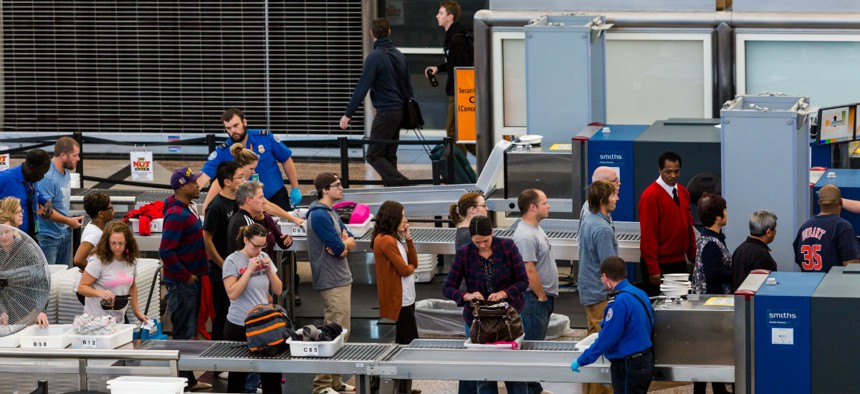
TSA officers inspect luggage at Denver International Airport. Arina P Habich/Shutterstock.com
TSA Union Says Heavy-Handed Leadership Is Making Employees’ Low Morale Worse
Agency is taking too many issues off the negotiating table, union says.
The Transportation Security Administration is robbing its employees of the bargaining rights held by all other federal employees, according to the union that represents most of the agency’s workers.
TSA Administrator Peter Neffenger issued new guidelines this week establishing what issues the American Federation of Government Employees can and cannot negotiate. AFGE called the determination overly restrictive, saying it would diminish the workforce’s already poor morale.
TSA ranked 313 out of 320 agencies in a 2015 survey of the best places to work in government.
“This new determination proves once again that TSA is not interested in following the universally accepted norms of labor law,” said AFGE President J. David Cox, Sr. “TSA wants to create a one-way relationship where the agency holds all of the cards, leaving TSA officers out to dry.”
The determination -- obtained by Government Executive -- is the third such document since TSA unionized in 2011, with the new memorandum replacing 2014 guidelines. Agency leaders said TSA's mission required a unique outline for collective bargaining, adding the framework “was designed to not adversely impact the resources and agility necessary to protect the security of the traveling public.”
Issues restricted from the collective bargaining process include pay and personnel actions that affect the agency, security policies, deployment of personnel and technology, performance standards, covert testing, certification requirements, discipline and “any action deemed necessary by the TSA administrator” during emergencies.
TSA’s transportation security officers -- 70 percent of the agency’s workforce -- won union representation in 2011, but do not currently enjoy the same bargaining rights as other federal employees with labor backing. AFGE and TSA have maintained a strained relationship since employees unionized five years go.
In a meeting with reporters earlier this year, Cox said the agency has abused its unilateral power to control negotiations, pointing to a recent decision to remove parking from the bargaining table. The determination, however, put parking subsidies back up for negotiation. In December, unionized employees narrowly avoided facing an extended period without a collective bargaining agreement in place when the agency and AFGE agreed at the 11th hour to a majority of provisions of a new contract.
The union members failed to ratify the resulting agreement, however, and the two sides are currently back at the bargaining table through Oct. 3. Issues such as the performance evaluation system, adjustment of schedules, special assignments and uniform allowance proved to be major sticking points in the last round of negotiations.
If the union and TSA are again able to reach agreement on a majority of the issues by Oct. 3, the existing agreement would be extended through Dec. 8. If no final document is ratified by then, TSA will have full control of all workforce issues starting Dec. 9.
Lawmakers have pushed legislation to give TSA employees the same collective bargaining rights as the federal workforce that falls under Title V of the U.S. Code, as well as appeal rights to the Merit Systems Protection Board.
TSA declined to comment for this story.
Image via Arina P Habich/Shutterstock.com.







